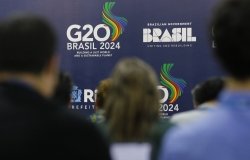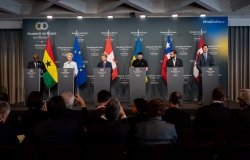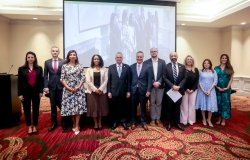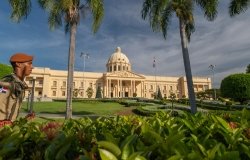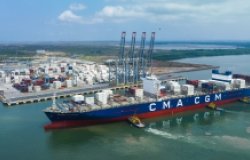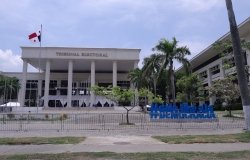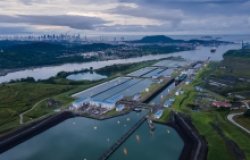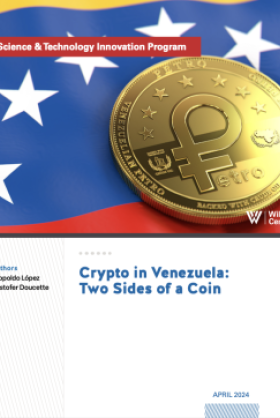Third International Trade Symposium
Panel I, 2007 Trade Policy Outlook: WTO Major Players' Perspectives; Panel II, Developments in Antidumping and Countervailing Duty Investigations; Panel III, WTO Dispute Settlement and Compliance Issues; Panel IV, Ethanol Production and Trade: the New Frontier
Overview
Panel II Powerpoints
Follow this link, to access the presentation of Fernando de Magalhães Furlan, of DECOM.*
Follow this link, to access the presentation of Claudia Marques, of Veirano Advogados.*
Panel IV Powerpoints
Follow this link, to access the presentation of Roberto Gianetti da Fonseca, Director of the Department for International Relations and Foreign Trade.*
Follow this link, to access the presentation of Paulo Strini Barbosa, of SCA Trading.*
Follow this link, to access the presentation of James Boyd, Vice-Chair of California Energy Commission.*
Relevant Web sites
Interamerican Ethanol Commission
Sociedade Corretora de Alcool
California Energy Commission
On February 16, the Brazil Institute and the ABCI Institute of Brazilian International Trade Scholars convened the third annual International Trade Symposium. This event brought together trade and economy specialists to discuss the prospects of future multilateral trade negotiations, antidumping and countervailing duty investigations, dispute settlement and compliance issues, and the growing production and trade of ethanol. Director of the Brazil Institute Paulo Sotero contextualized the state of trade negotiations, expressed pessimism over renewed talks of the Doha Round of the World Trade Organization (WTO), and suggested that perhaps more hope lies in bilateral agreements. Aluísio de Lima-Campos, chairman of the ABCI Institute and economic advisor at the Brazilian Embassy, offered further comments on the prospects of high-level multilateral negotiations.
The first panel was entitled 2007 Trade Policy Outlook: WTO Major Players' Perspectives. Angelos Pangratis, the deputy chief of mission for the E.U. Delegation in Washington, provided an E.U. perspective on key parameters of trade talks and analyzed the possibility for a breakthrough in negotiations. He argued that agriculture is key to unlocking negotiations, but that it is not the most important factor. Additionally, the European Union has already announced that it will completely eliminate export subsidies if others follow suit.
Matt Rohde, deputy assistant U.S. Trade Representative (USTR) for WTO Affairs, expressed cautious optimism over trade talks and the ensuing increase in meaningful trade flows. He acknowledged the intense behind-the-scenes diplomacy that is currently underway. Two days after the suspension of trade talks in July of 2006, U.S. Trade Representative Susan C. Schwab met with Brazilian Foreign Minister Celso Amorim, beginning an ongoing rigorous process of negotiations that has paved the wave for the potential renewal of talks.
Trade agreements require intense negotiations and more concessions from all parties now that the developing world is better informed and more capable of pressing their demands, explained Banashri Harrison, the minister for commerce at the Embassy of India. Development must remain the central goal of the Doha Round, she averred. India has 650 million citizens that depend primarily on agriculture, making agriculture not only an issue of trade for India, but one of survival.
U.S. Congress has grown dismissive from impatience about the Doha Round, argued Tim Reif, the staff director of the Trade Subcommittee of the House Ways and Means Committee. Unless the trade breakthrough is meaningful, he fears that Congress will not accept trade deals. However, in terms of bipartisan cooperation on the issue, one could not ask for a more opportune moment: Reif lauded the efforts of Committee Chairman Charles Rangel and the Ranking Member Jim McCrery.
Minister Roberto Carvalho de Azevêdo, undersecretary for economic and technological affairs at the Brazilian Ministry of Foreign Relations, took issue with Pangratis' assertion that agriculture is not the most important aspect of Doha. The Round's primary emphasis was—and always will be—agriculture. Not only is agriculture key to development, he argued, but it is also the sector in which the largest trade distortions lie. He noted that, just as the United States and the European Union do not intend to fully cut trade distorting tariffs, Brazil also has sensitivities that likewise should be kept in mind.
The second panel was entitled Developments in Antidumping and Countervailing Duty Investigations. Fernando de Magalhães Furlan, the director of the Brazilian Trade Remedies Department, explained that Brazil currently has 74 dumping investigations and remedies in force, while there are 61 against Brazilian exports. In a future Doha Round treaty, Brazil seeks an improvement and clarification of trade remedy rules, as well as the reduction of the level of discretion of investigating authorities. Furlan argued that the use of zeroing should be prohibited, while the lesser duty rule and sunset review be embraced.
Claudia Marques, an associate at Veirano Advogados, detailed recent developments in antidumping and countervailing duty investigations in Brazil. She noted that all eleven new antidumping investigations initiated in 2006 were directed against China, in accordance with Brazil's discretionary power to treat non-market economy countries differently. While Brazil signed a memorandum of understanding with China in 2004 in recognition of its market economy status, Brazil never formally adopted this condition into its legal system.
With the exception of Brazil, fewer and fewer trade investigations and remedies are being initiated and implemented, according to Dan Ikenson, a trade policy analyst for the Cato Institute. This is because the world economy is steadily growing and also because a case might ensnare an allied company and disrupt one's supply chain. Ikenson dispelled the myth of WTO anti-U.S. bias by showing that the United States wins about 88 percent of its cases—as do all other countries on average. He warned that if the United States continued to disregard WTO decisions, it is rational to assume that China will do the same.
Terence Stewart, a partner with Stewart & Stewart, explained the state of antidumping and countervailing duty investigations in the United States in the past year. He noted that the decision was reconfirmed to continue treating China as a non-market economy. Additionally, the U.S. International Trade Commission and Department of Commerce reconfirmed the decision to open up a closed case when fraud has been demonstrated.
The third panel was entitled WTO Dispute Settlement and Compliance Issues. Flávio Marega, the Head of the Dispute Settlement Division of the Brazilian Foreign Ministry, addressed issues of non-compliance within the WTO's Dispute Settlement System (DSS). He criticized the United States for failing to comply with measures adopted under the Dispute Settlement Understanding during the Uruguay Round. He specifically charged the United States with enacting unfair antidumping and zeroing measures. He claims that the United States is not fulfilling its duties and responsibilities as a WTO member, which undermines the legitimacy of the "crown jewel of the WTO" – i.e. the DSS.
Welber Barral, an international trade law professor at the Federal University of Santa Catarina in Brazil, analyzed Brazil's status within the DSS. He noted that although Brazil makes up only 1 percent of world GDP, it accounts for 14 percent of all WTO trade disputes. He cautioned any overzealous disputes since the contentious process is costly, time-consuming and yields generally uncertain results.
John Greenwald, a partner at Wilmer Hale LLP, criticized the DSS for its structural imbalances and legal rigidity. He claimed that in the big picture of world trade, dispute settlement encompasses a minor and juridical part: the DSS is in incapable of dealing with "intractable problems" like agriculture and intellectual property rights. Instead, as exemplified by the Brazilian dispute concerning frozen chicken cutlets, the DSS only handles very specific disputes. Greenwald argued the current structure is too restrictive; it doesn't allow negotiators to build "deliberate ambiguities" into trade agreements. Flexibility is necessary for the survival of the international trade system, he insisted.
James Bacchus, senior partner at Greenberg Traurig LLP, countered Greenwald's analysis by emphasizing the role of the DSS in resolving trade disputes, not rendering legal rulings or developing jurisprudence regulations. Bacchus stressed that the DSS serves, as it should, as a last resort. Speaking in more general terms, Bacchus objected to the growing trend of bilateral trade agreements and stressing the importance of a multilateral approach.
The fourth panel was entitled Ethanol Production and Trade: the New Frontier. Director of the Brazil Institute Paulo Sotero argued that Brazil's status as a leading ethanol producer is not a threat to U.S. domestic production, but rather an opportunity for collaboration. Minister-Counselor Carlos Alfredo Lazary Texeira, Chargé D'Affairs of the Brazilian Embassy, affirmed that cooperation the world's two leading ethanol producers is essential to turning ethanol into a global commodity. Such a development is predicated upon the sharing technology and lowering agricultural tariff barriers.
On December 18, 2006, the Inter-American Ethanol Commission (IEC), spearheaded by Florida Governor Jeb Bush, was launched to create a regional market for ethanol. The IEC aims to increase U.S. consumption of ethanol to 15 billion gallons of ethanol by 2015. Brian Dean, executive director of the IEC, explained that the primary objectives of the IEC are to encourage more countries to produce ethanol by advancing research and development.
According to Paulo Sergio Strini Barbosa of Sociedade Corretora de Álcool, 318 ethanol plants currently operate in Brazil. Brazil's ethanol production was initiated by the government in response to the late 1970's oil shocks. While the government provided incentives to cover 100 percent of ethanol production and consumption during the 1980's, current growth in the ethanol industry is fully financed by private investments. Barbosa noted that Brazil is projected to double ethanol exports within the next five years, and 77 percent of new car sales are now flex-fuel vehicles, able to run on any mixture of gasoline and ethanol.
James Boyd, vice chair of the California Energy Commission, discussed California's prominent role in utilizing and promoting alternative fuels. He maintained that the state's shift towards alternative fuels has been driven by limited energy sources, air quality, and a desire to reduce the state's dependence on oil. As an alternative fuel source, ethanol is a central piece of the state's energy diversification strategy. One of the policy options aimed at increasing production and consumption of the commodity is the Low Carbon Fuel Standard, requiring fuel providers to decrease carbon intensity of average annual sales.
Roberto Gianetti da Fonseca, director of Brazil's Department for International Relations and Foreign Trade, dispelled the myth that Brazil wants to displace the U.S. domestic production of ethanol. Brazil wants to develop a biofuels partnership with the United States to make production more efficient, increase cellulosic yields, decrease transportation costs, promote greater specialization, build an ethanol futures and options market, and provide developing countries with a sustainable development strategy.
Jon Doggett, vice president of the Corn Growers Association, explained how, with the use of private and public funding, the ethanol industry was able to develop and produce ethanol efficiently. Doggett echoed calls to develop a global market for ethanol but cautioned against an overly optimistic view of domestic production, considering a possible "blend wall," with increased demand outpacing the structural and logistical limits of supply.
Written by Daniel Budny and Alan Wright: 202.691.4087.
Hosted By

Brazil Institute
The Brazil Institute—the only country-specific policy institution focused on Brazil in Washington—works to foster understanding of Brazil’s complex reality and to support more consequential relations between Brazilian and US institutions in all sectors. The Brazil Institute plays this role by producing independent research and programs that bridge the gap between scholarship and policy, and by serving as a crossroads for leading policymakers, scholars and private sector representatives who are committed to addressing Brazil’s challenges and opportunities. Read more

Latin America Program
The Wilson Center’s prestigious Latin America Program provides non-partisan expertise to a broad community of decision makers in the United States and Latin America on critical policy issues facing the Hemisphere. The Program provides insightful and actionable research for policymakers, private sector leaders, journalists, and public intellectuals in the United States and Latin America. To bridge the gap between scholarship and policy action, it fosters new inquiry, sponsors high-level public and private meetings among multiple stakeholders, and explores policy options to improve outcomes for citizens throughout the Americas. Drawing on the Wilson Center’s strength as the nation’s key non-partisan policy forum, the Program serves as a trusted source of analysis and a vital point of contact between the worlds of scholarship and action. Read more
Thank you for your interest in this event. Please send any feedback or questions to our Events staff.
